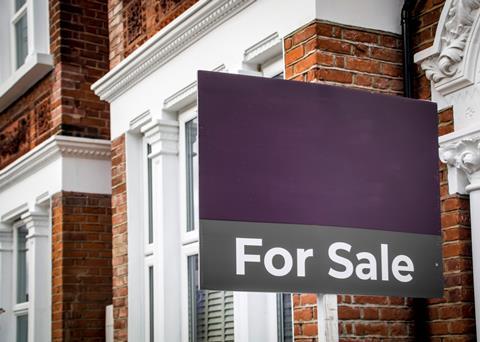RICS records ninth successive month of surveyors recording falling demand
The housing market remained “muted” and is likely to remain so until it adjusts to the higher rate of interest, RICS has said today.

It has recorded the ninth successive month of negative buyer demand in its January residential survey.
Demand went down to -47% last month compared to -40% in December. This means there was a higher proportion of surveyors reporting a fall than a rise (see box below).
“Near-term expectations suggest this picture is likely to remain in place for a while longer as the market adjusts to higher interest rates in the UK,” the surveyors’ body predicted.
Respondents to the monthly survey also reported that national house prices were on a downward trend, with a net balance of -47% in January compared to -42% in December.
This reflects other house prices indices.
The Halifax reported on Tuesday annual house price growth had dropped to its lowest level for three years, the Nationwide said UK house prices fell 0.6% in January and Zoopla showed the market started to stall in the last quarter of 2022.
Simon Rubinsohn, chief economist at RICS, said: “Although some respondents to the January RICS survey have noted a little more interest in the housing market as the new year got underway, the overall tone of the feedback still remains subdued which is not altogether surprising given the jump in mortgage rates since the autumn.” Mortgages went up to a 14 year high in October following the government’s disastrous mini-Budget in September last year.
Prices were going down because they were “beginning to reflect the shift in balance between demand and supply”, Rubinsohn said. As demand dropped so did fresh listings in January too but with a relatively modest net balance of -14%.
RICS UK Residential Market Survey explained
The RICS UK Residential Market Survey is a monthly sentiment survey of chartered surveyors who operate in the residential sales and lettings markets. Surveyors are asked 18 questions on a range of metrics such as sales, enquiries, listings and house prices and are asked whether these have increased, stayed the same or decreased.
The ‘net balance’ refers to the proportion of respondents reporting a rise in a metric minus those reporting a fall.
For example, if 30% reported an increase in buyer enquiries and 5% reported a fall, the net balance would be +25%.
Although Rubinsohn said it was “questionable” about how much house prices would go down by “given that recent macro forecasts from the Bank of England and others are now envisaging a less harsh economic environment this year”.
The Bank of England last week put the interest rates up half a percentage point to 4% but predicted the recession in the country would now be shorter and shallower than previously thought.
RICS believed the sales outlook for the year was more positive than before, with a net balance of -20% in January compared to -42% in December.
>>See also: Construction activity falls at fastest rate since 2020 as housebuilding drops off
>>See also: Barratt cuts new homes forecast as demand remains ‘tentative’
The rental market continued to look strong, the body showed, with tenant demand increasing to a net balance of +43%. Although, landlord instructions fell for the tenth quarter in a row, with the latest net balance reading of -14%.
Nearly two-thirds (64%) of the survey participants to January’s survey believed built-to-rent (BTR) would play a bigger part in the housing market in the future.
Although 48% felt BTR would only be “somewhat successful” in filling the shortall in rental properties longer term.
Rubinsohn said: “While build-to-rent clearly has a role to play in helping to fill this gap, the insights from the latest survey suggest that this is not going to be sufficient, at least in the near term, to address the challenge in this market.”



























No comments yet